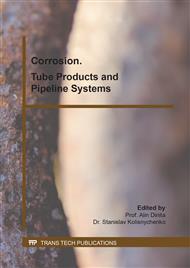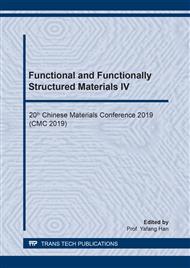p.1155
p.1160
p.1168
p.1174
p.1183
p.1190
p.1196
p.1203
p.1209
Experimental Study on Flow-Induced Corrosion of Casing and Tubing Steel for Heavy Oil Thermal Recovery Wells
Abstract:
The tubing and casing in the thermal recovery well are subjected to corrosion damage of multiple thermal fluid flow during the service period, which may cause safety accidents such as thinning, perforation and even fracture of the pipe wall. In this paper, the corrosion behavior of J55 casing steel and N80 tubing steel in flowing media were studied by using high temperature and high pressure reactor. The test results reflected the effects of single gas concentration and temperature of O2 and CO2 on tubing and casing corrosion. Comparing and analyzing the corrosion law of tubing in distilled water and produced water, the results of column corrosion rate under hot steam injection and production conditions were obtained, which indicated the difference of corrosion and the influencing factors of tubing in two working conditions.
Info:
Periodical:
Pages:
1183-1189
DOI:
Citation:
Online since:
May 2020
Authors:
Keywords:
Price:
Сopyright:
© 2020 Trans Tech Publications Ltd. All Rights Reserved
Share:
Citation:



